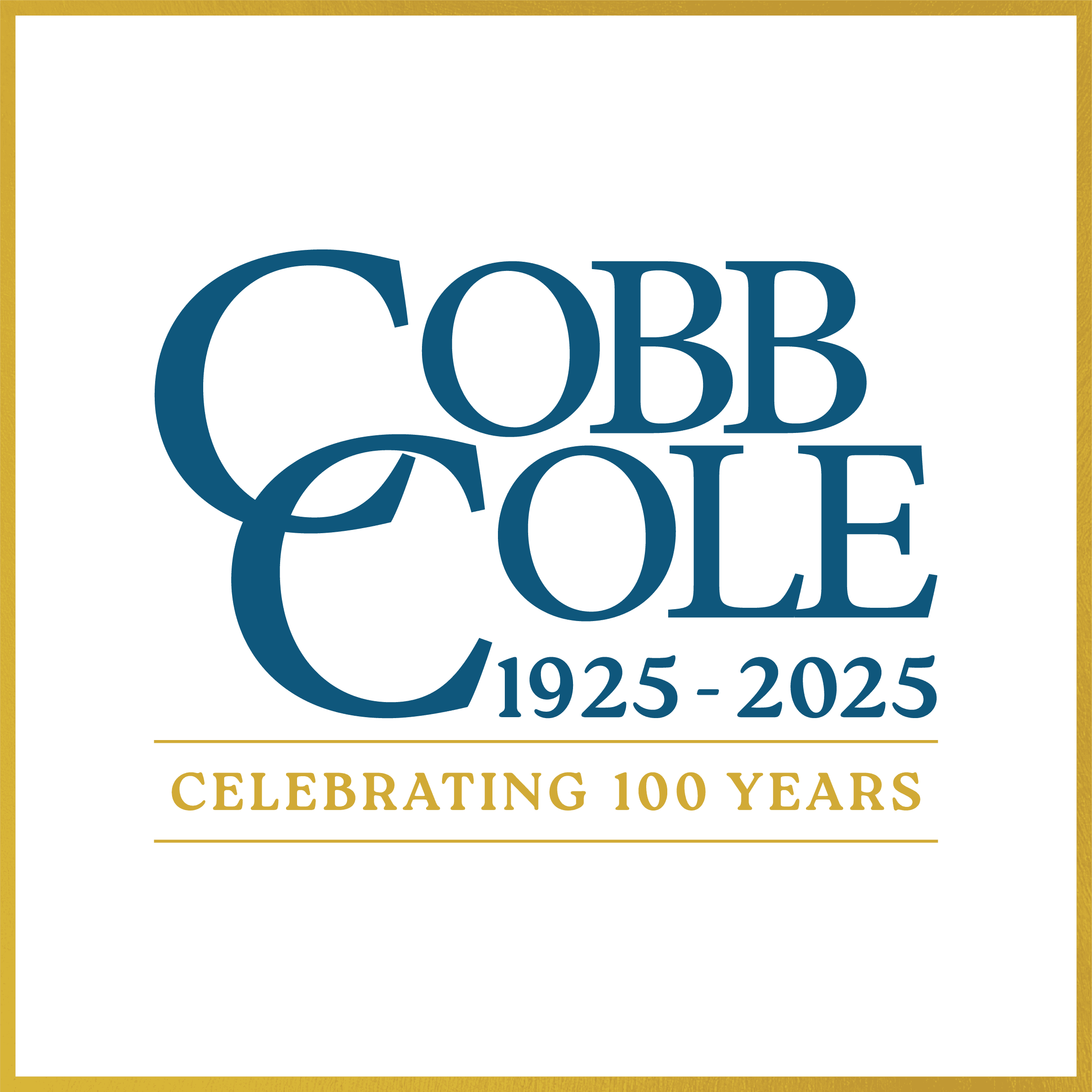Whether you’re the plaintiff or defendant in a lawsuit, winning your case depends greatly on the litigation strategy your attorney creates. A litigation strategy is a comprehensive plan designed to achieve the best outcome for your legal matter, including settlement before trial.
The litigation attorneys at Cobb Cole have been defending their clients’ interests for nearly a century. We work with you to develop a litigation strategy tailored to your case’s unique variables, whether it involves business litigation, construction litigation, alternative dispute resolution, or one of the many other types of cases that sometimes go to trial.
We understand our role as your litigation attorney is to protect your interests in and outside the courtroom. Our strong track record of successful verdicts and settlements is a testament to the time and work we put into each case we handle.
What is a Litigation Attorney?
Litigation attorneys represent their client’s interests in legal actions they either take or that are taken against them. Often referred to as trial lawyers, they provide assertive and effective representation while helping manage personal and professional legal matters.
Typical duties of litigation attorneys include:
- Drafting pleadings
- Responding to discovery requests
- Taking depositions
- Investigating case facts
- Consulting potential expert witnesses
- Negotiating with opposing attorneys
- Appearing in court
Perhaps most importantly, a litigation attorney creates a thorough strategy for pursuing your case or defending you in court.
Building a Litigation Strategy
The best litigation strategies are developed to maximize your chance for a favorable outcome in court. But while the goal of the litigation process is to win, defining “winning” can differ based on case facts and client preferences.
It’s estimated that somewhere between 95 and 97 percent of lawsuits are settled before trial. However, a good litigator knows that a litigation strategy should not be built based on the assumption that a case will settle. Instead, it’s best to prepare to win in court. This way, you’re in a better position to achieve the most favorable settlement—or try the case if it’s one of the rare matters to go to trial.
All litigation strategies are subject to change as new evidence is discovered and additional witnesses are added. Pretrial rulings and situational changes can also affect your trial strategy. Your litigation attorney will review and update the strategy from time to time to ensure your interests and objectives are always prioritized.
When crafting a strategy, litigation attorneys typically analyze your case’s strengths and weaknesses and evaluate the potential risks and rewards of different legal tactics. These are some of the factors most attorneys consider when developing a litigation strategy.
Case Assessment
When analyzing your case, the attorney reviews all relevant documents and other evidence, interviews witnesses, and researches applicable laws and legal precedents. This helps them decide whether your best course of action is to settle or go to trial and which tactics they should take to ensure you have the greatest opportunity to win your case.
Case Management
Proper case management is critical to a case’s success. It involves:
- Coordinating with experts, witnesses, and legal staff.
- Setting timelines and goals, including desired outcomes.
- Communicating regularly with the client to keep them updated on the case’s progress and to seek input on key decisions.
- Developing a case strategy that helps the client achieve their goals and prepares for any unexpected developments that arise during discovery or trial.
- Gathering and analyzing evidence that supports the client’s case.
- Managing fees and costs to avoid any surprises later on.
- Trial preparation, including drafting trial briefs and preparing witnesses.
All of this requires thoughtful planning and strict attention to detail so that deadlines are met and nothing falls through the cracks.
Client Goals
Litigation attorneys work closely with clients to understand their goals and priorities which can range from preserving their reputation to maximizing monetary damages. Each client Cobb Cole works with has distinctly individual goals and objectives, but they typically include:
- Requesting compensation for suffered damages like lost income, medical expenses, and pain and suffering.
- Rights protection. Litigation is sometimes needed to protect and enforce property, civil, or contractual rights and keep others from violating them.
- Holding individuals or entities accountable. For instance, a client might pursue a case against an employer for violations of state and federal labor laws.
- Dispute resolution. Disputes cover everything from arguments between divorcing partners to intellectual property disagreements. Litigation is sometimes the only way to resolve these disputes.
- Legal precedent. Some cases go to trial in order to clarify existing laws or establish legal precedents. Examples are cases that have broad societal implications, such as environmental matters.
- Defending against claims made against them, including lawsuits, criminal charges, and regulatory actions.
At Cobb Cole, we work closely with your to understand your goals and develop a litigation strategy that aligns with them.
Evidentiary Process
The process of collecting, analyzing, and introducing evidence is a crucial aspect of any legal proceeding, ensuring the case’s facts are accurately presented. Evidence includes, among other things, witness statements, documents, and expert testimony.
As an attorney gathers evidence for litigation, they:
- Identify relevant evidence that supports the case.
- Preserve the evidence by making copies of all physical documents and duplicating or backing up electronic evidence like emails and text messages.
- Conduct investigations by reviewing evidence, interviewing experts and witnesses, and conducting site inspections.
- Use discovery tools like interrogatories (written questions), depositions, and requests for production.
- Hire experts to provide medical, financial, or other testimony or analysis that supports your case.
- Evaluate the admissibility of the gathered evidence gathered.
Risk Assessment
While your attorney buildings a litigation strategy based on your case going to trial, they also assess the risks associated with doing so, so you can make an informed decision.
Considerations include:
- Evaluating the case and estimating the likelihood of success.
- Identifying possible outcomes, including potential damages awarded.
- Considering settlement options to avoid the risks and costs associated with litigation.
- Assessing your opponent and their attorney.
- Researching a judge’s prior decisions and rulings.
- Considering your reputation and how a trial might affect your business interests.
Your attorney will also prepare a cost-benefit analysis to see if pursuing a trial is in your best financial interests.
Negotiation and Settlement
It might seem strange that an essential component in building a litigation strategy is considering the possibility of negotiation and settlement. But all good litigation attorneys should be prepared to negotiate a settlement if it meets their client’s objectives and helps them avoid the risk and expense of a lengthy and stressful trial.
Aside from ending the case more quickly, negotiating and settling with the other party offers a degree of control and certainty that litigation doesn’t. You avoid the potential for an unfavorable verdict, and you can often preserve relationships or move forward with less animosity.
Trial Preparation
“Trial prep” is essential to winning a legal matter. As part of the strategy process, litigators should:
- Anticipate possible objections and prepare responses to them.
- Conduct mock trials.
- Prepare witnesses for direct and cross-examination.
- Draft an opening statement and closing argument.
- Prepare trial exhibits like diagrams, charts, and other visual aids.
- Review case law so they’re prepared to respond or object quickly during the trial.
If your case is a complex one like intellectual property, your attorney might also develop a trial “theme” that makes it easier for the jury to understand the issues in dispute. They’ll also imagine and anticipate the opposing attorney’s strategy to prepare for objections they might raise.
Communication
Making communication a top priority enables a litigator to best represent their client’s interests and achieve a favorable outcome. Good communication:
- Builds trust and gives you greater confidence in your attorney’s ability to represent you.
- Helps to manage expectations about everything from timelines to potential damages received.
- Fosters collaboration between you and your attorney so you can achieve your litigation goals.
- Keeps you informed about your case’s progress and any developments that might impact the outcome.
- Promotes informed decisions, including whether to accept a settlement offer or go to trial.
- Minimizes surprises and unexpected developments or strategy changes during the litigation process.
Cobb Cole: Litigation Strategies That Lead to Successful Outcomes
The litigation strategy your attorney chooses is based on multiple factors, including the matter’s nature, your goals and priorities, and the potential risks and rewards of various legal tactics. It’s important to consult with your lawyer about these factors, as they will greatly affect the outcome of your case.
It’s sometimes said that the winning side in a trial is the one that best figures out which issues matter most. There’s a lot of truth to the statement, and adopting that mindset can help you and your attorney obtain evidence and answers that you might not otherwise have gotten.
In truth, litigation is an art form that not many lawyers master. In our view, the best litigation strategies come with experience. Because each case has its unique set of facts, it’s a litigating attorney’s job to shape a strategy according to the case at hand. But doing so requires extensive knowledge in navigating the legal systems, arguing effectively, and making persuasive appeals to the jury and judge.
At Cobb Cole, our talented legal team draws on past successes to develop and refine its approach to any given case. They understand the legal system’s nuances and quirks, have a deep knowledge of the law, and can quickly adapt to a case’s changing circumstances.
Contact Cobb Cole today to learn more about what you can expect during the litigation strategy-building process and how we can help bring your legal matter to a positive conclusion.

